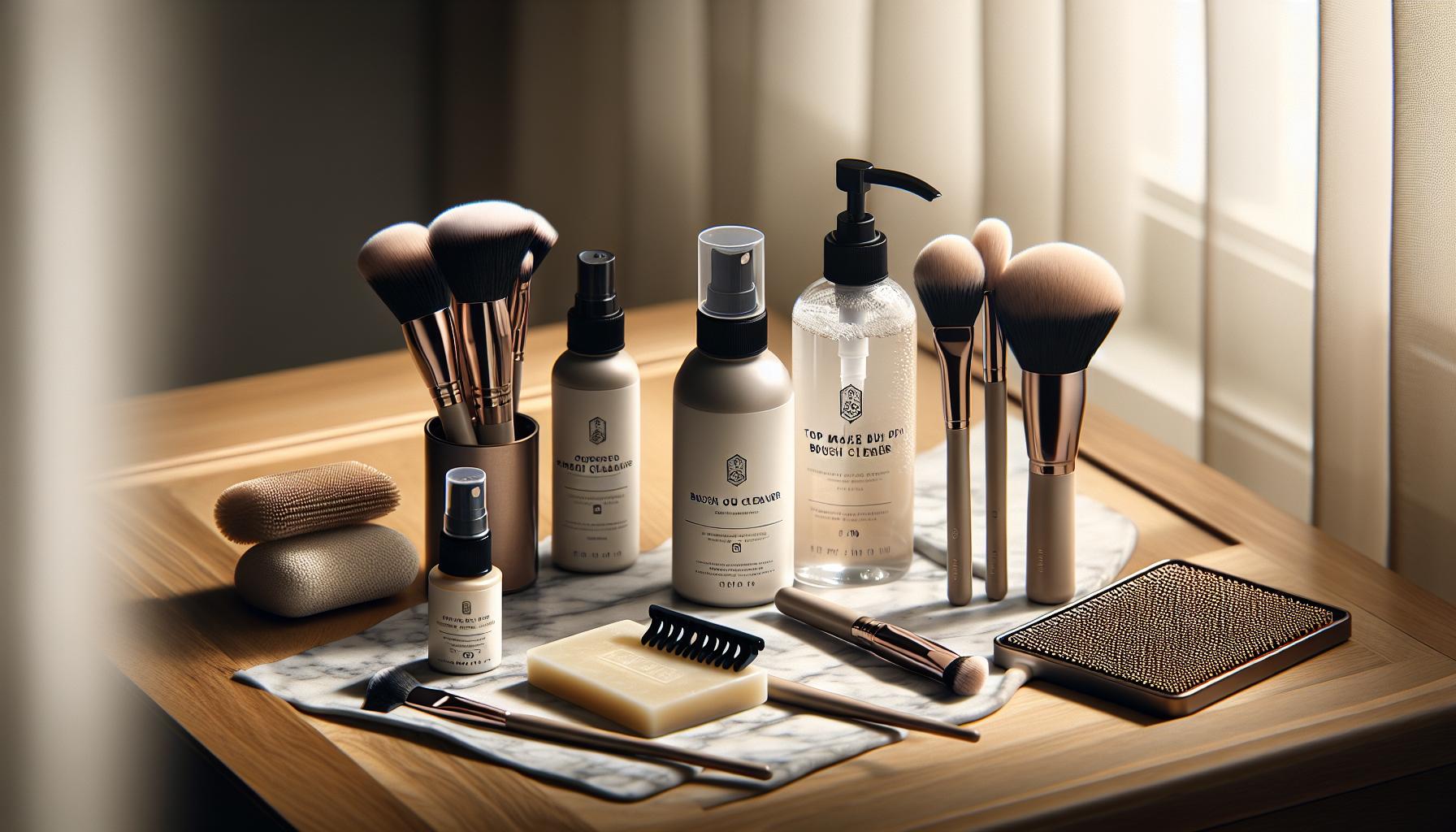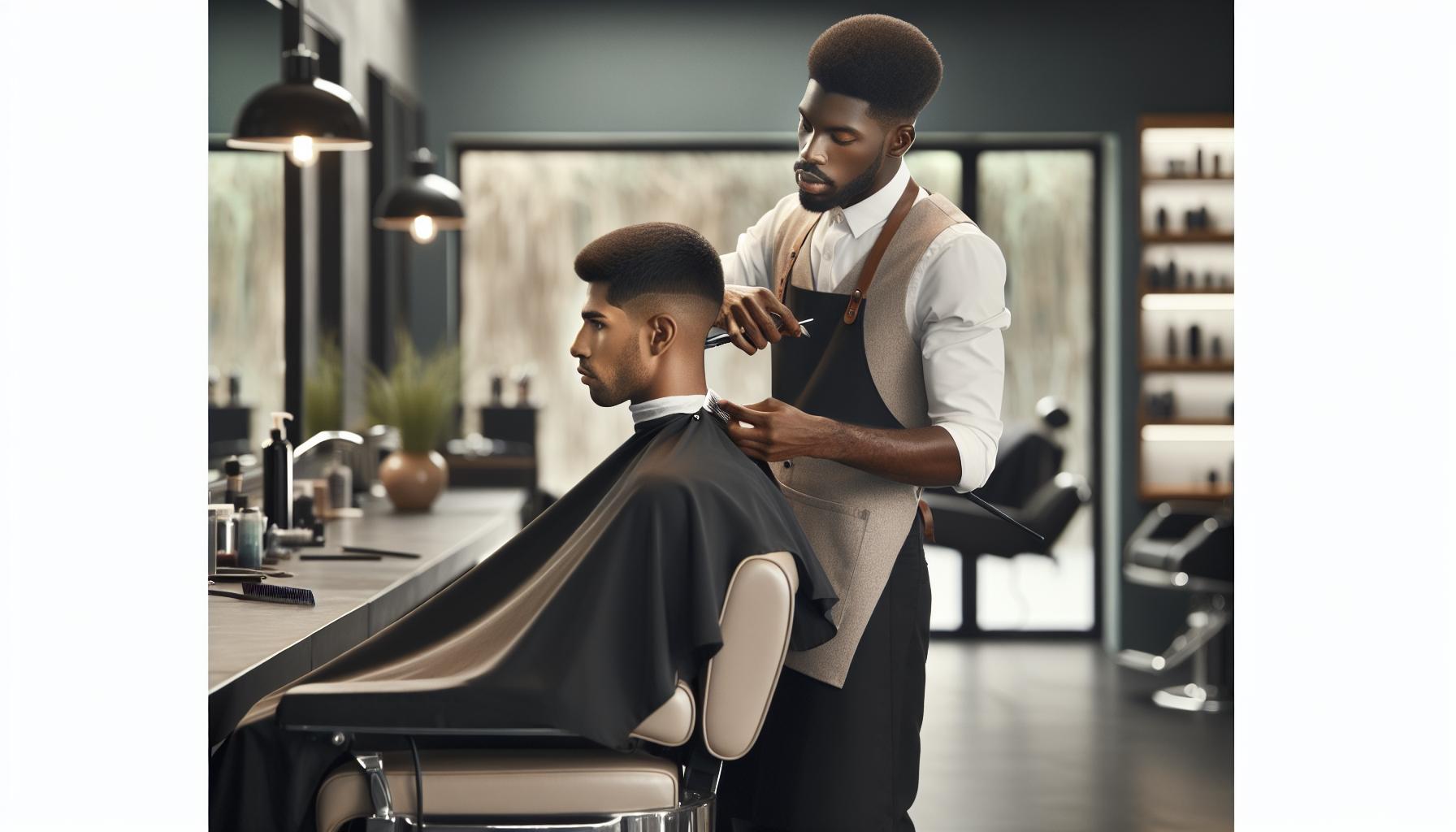Did you know that using dirty makeup brushes can lead to pesky breakouts and uneven application? Keeping your brushes clean is essential not just for flawless makeup but also for maintaining healthy skin. In our “Makeup Brush Cleaner Reviews: Best Products for Deep Clean,” we will explore top-rated cleaning solutions that effectively remove makeup residue and bacteria, allowing your brushes to work their best and last longer. With countless products available, finding the right one can be overwhelming, but we’re here to help you navigate the options. Dive in to discover the best brush cleaners that meet your needs, ensuring a hygienic beauty routine that enhances your look effortlessly. Your journey to pristine brushes starts here, promising results that will inspire confidence, whether you’re a makeup newbie or a seasoned pro.
Choosing the Right Makeup Brush Cleaner for Your Needs
Choosing the right makeup brush cleaner can make a significant difference not only in the longevity of your brushes but also in the quality of your makeup application. With an array of options available, it’s essential to identify a product that suits your specific needs, whether you are a makeup novice or a seasoned professional. Consider the following factors when selecting the ideal cleaner.
First, think about the type of product you prefer. Liquid cleansers are typically effective for deep cleaning your brushes, helping to remove stubborn makeup residues. On the other hand, brush cleaning sprays are great for quick cleanses between uses and are especially useful for softening the bristles without drying them out. For those who prefer convenience, wipes can offer a fast solution, perfect for on-the-go touch-ups.
Another crucial aspect is the ingredients used in the cleaners. If you have sensitive skin or are conscious of harsh chemicals, explore natural options made with plant-based ingredients. These cleaners can remove makeup effectively while being gentle on both your brushes and your skin. Furthermore, if you’re a professional artist or use your brushes frequently, investing in higher-quality, professional-grade cleaners can enhance the maintenance and longevity of your tools.
Lastly, consider the ease of use and storage. Many cleaners come with unique applicators, such as spray bottles or soap bars, that make the cleaning process straightforward and efficient. Choosing a bottle with a pump can minimize spills, making it practical for busy makeup stations. The convenience of storage should not be overlooked either-look for products designed to fit easily within your existing beauty storage setup. By aligning your choice with these considerations, you can ensure a cleaner, more effective makeup experience.
Top Makeup Brush Cleaners: Our Expert Picks
When it comes to achieving flawless makeup application, the cleanliness of your brushes is paramount. Investing in a high-quality brush cleaner can elevate your beauty routine to a new level. With a multitude of products on the market, we have examined the landscape and compiled a selection of top-rated makeup brush cleaners that stand out for their effectiveness, ease of use, and formulation.
Our Top Picks
- Beautyblender Liquid Blendercleanser: Specifically formulated for sensitive skin and sponge cleaning, this liquid brush cleaner excels in removing stubborn makeup residue without harsh chemicals. Its gentle, yet powerful blend ensures your brushes remain soft and in prime condition.
- Sephora Collection Daily Brush Cleaner: This spray cleaner offers a quick and convenient option for daily use. The lightweight formula allows for fast drying, making it perfect for busy professionals who need clean brushes on the fly.
- Cinema Secrets Brush Cleaner: A favorite among industry professionals, this brush cleaning solution is renowned for its deep cleaning capabilities. It effectively eliminates all traces of makeup, oils, and bacteria, while conditioning bristles to extend their lifespan.
- Paula’s Choice Liquid Brush Cleaner: Known for its gentle, cruelty-free ingredients, this liquid cleaner is ideal for those who prioritize natural formulations. It removes dirt and makeup residues while respecting the integrity of the brush fibers.
- Eco Tools Makeup Brush Cleansing Shampoo: For eco-conscious users, this shampoo is a winner. Made with natural ingredients, it deeply cleans brushes while being kind to the environment, making it a sustainable choice for green beauty enthusiasts.
Each of these products brings unique benefits tailored to different needs, whether you’re looking for a fast spray cleaner for daily refreshes or a robust liquid solution for an in-depth cleanse. Emphasizing quality ingredients that are safe for both your brushes and your skin, these top selections are designed to keep your makeup tools in tip-top shape, ensuring a smooth application every time. Cleaning your brushes regularly with these effective products not only enhances your finished look but also promotes better skin health-truly a win-win scenario in your beauty routine.
How to Deep Clean Your Makeup Brushes
To ensure your brushes remain in top condition and free from harmful bacteria, a thorough deep cleaning routine is essential. Deep cleaning not only removes buildup of makeup, oils, and dirt but also extends the lifespan of your brushes, allowing for optimal performance. Here’s a practical guide to getting your brushes as clean as possible using various effective methods.
Start by selecting a suitable brush cleaner. For a deep clean, liquid cleansers are typically the most effective. Look for products that are specifically designed for makeup brushes, such as the Cinema Secrets Brush Cleaner known for its powerful formulation that breaks down tough residues. Another excellent option is the Eco Tools Makeup Brush Cleansing Shampoo, which provides a gentle and natural cleaning experience.
To begin the deep cleaning process, fill a small bowl with lukewarm water and add a few drops of your chosen brush cleaner. Swirl the brush in the solution for a few seconds, allowing the cleanser to penetrate the bristles. Be sure to keep the brush head facing downward so that water doesn’t reach the ferrule (the metal part of the brush), which can loosen the glue and degrade the brush over time. After lathering the bristles, rinse the brush under lukewarm water until the water runs clear, ensuring all cleaner and debris are fully washed away.
Once rinsed, gently squeeze out excess water with a clean towel-the goal is to maintain the shape of the brush head while removing moisture. To dry your brushes effectively, lay them flat on a clean towel or over the edge of a countertop, allowing air to circulate around the bristles without distorting their shape. Avoid standing brushes upright in a cup, as this can waterlog the bristles and lead to mold or mildew.
For those looking for a DIY approach, a blend of baby shampoo and olive oil can also serve as an effective brush cleanser. Mix two parts shampoo with one part olive oil, then follow the same cleaning steps outlined above. This natural solution not only cleans your brushes thoroughly but also conditions the bristles, keeping them soft and supple.
Incorporating this deep cleaning routine into your beauty regimen, ideally every two to four weeks depending on usage, will not only enhance your makeup application but also contribute to healthier skin and a longer life for your beloved brushes. Regular cleaning fosters a hygienic environment for makeup application, ultimately leading to a more flawless finish every time.
Natural vs. Chemical Makeup Brush Cleaners
Choosing between natural and chemical makeup brush cleaners involves understanding the unique benefits and potential trade-offs each type offers. Natural cleaners are often derived from organic ingredients, appealing to those mindful of environmental impact and skin sensitivity. For example, many DIY recipes utilize items like baby shampoo or olive oil, which can effectively cleanse brushes while conditioning the bristles. These gentle solutions typically contain no harsh chemicals, making them suitable for sensitive skin and helping to avoid potential irritation.
On the other hand, chemical cleaners are specifically formulated to target stubborn makeup residue and bacteria, ensuring a deeper clean with minimal effort. Products like the Cinema Secrets Brush Cleaner are renowned for their ability to quickly dissolve heavy makeup buildup, which can significantly enhance brush maintenance efficiency. While these cleaners may contain synthetic ingredients and alcohol, they are often designed to dry quickly, offering a fast turnaround between uses, which is especially beneficial for makeup artists or everyday users with busy schedules.
When considering which option suits your needs best, weigh your priorities. If you prefer a cleaner that’s gentle and eco-friendly, a natural option might be your best bet. However, for those who require a powerful clean that quickly eliminates all traces of product, a chemical cleaner could be the more effective choice. Always read the ingredients and product reviews to ensure that whichever option you choose aligns with your skin type and personal values regarding clean beauty practices.
Step-by-Step Guide to Cleaning Makeup Brushes
Cleaning your makeup brushes regularly is essential not only for maintaining the longevity of the brushes but also for ensuring healthy skin. Inadequately cleaned brushes can harbor bacteria, oils, and old makeup, leading to breakouts and reduced makeup application efficacy. Follow this straightforward guide to achieve pristine brushes that elevate your beauty routine.
Start by gathering your cleaning supplies. You’ll need a brush cleaner of your choice-this could be a commercial product or a DIY solution using mild soap or shampoo-and a clean, soft towel for drying. Make sure you have a clean bowl or a sink with lukewarm water ready.
Begin the cleaning process by wetting the bristles with lukewarm water. Avoid submerging the entire brush in water, as this can damage the glue that holds the bristles in place. Instead, focus on the bristle area. Apply a small amount of your chosen cleaner directly onto the bristles, or pour some into a bowl. For deep cleaning, gently swirl the brush in the solution for a few seconds.
Rinse the brush bristles while pointing them downward to prevent water from running up the handle, which can cause bristle shedding. Continue rinsing until the water runs clear, indicating that all makeup residue has been removed. After rinsing, gently squeeze the bristles to remove excess water and reshape them to their original form before laying them flat on a clean towel to dry. Do not stand them upright, as this can lead to water settling into the ferrule.
To maintain your brushes, consider establishing a regular schedule-clean them at least once a week if you use them daily. Additionally, keep an eye out for signs that a deeper clean is needed, such as visible buildup of product or a change in texture. Clean brushes not only help improve makeup application but also significantly contribute to healthier skin, ensuring your beauty routine remains both effective and safe.
DIY Makeup Brush Cleaner Recipes
Crafting your own makeup brush cleaner can be a fun and eco-friendly solution to keeping your brushes in pristine condition. Not only are these DIY recipes often more cost-effective than commercial cleaners, but they also allow you to control the ingredients, ensuring that they are gentle on both your brushes and skin. Here are a few simple yet effective recipes that can help maintain the integrity of your brushes while ensuring a thorough clean.
Simple Soap and Water Cleanser
For a quick and efficient solution, combine mild dish soap with warm water.
- Ingredients: 1 part mild dish soap, 2 parts warm water
- Instructions: In a bowl, mix the soap and water. Dip your brushes in the solution, swirling them gently to break down makeup residues. Rinse under warm running water until the water runs clear.
Olive Oil and Vinegar Solution
This mixture not only cleans but also conditions your brushes, making them last longer.
- Ingredients: 1 tablespoon olive oil, 1 tablespoon white vinegar
- Instructions: Combine the olive oil and vinegar in a bowl. Dip the bristles into the mixture, then gently massage the bristles to loosen dirt and makeup. Rinse thoroughly with warm water, ensuring no oils remain.
Alcohol-Based Sanitizer
Perfect for a quick disinfecting clean, especially after using brushes on others, this recipe also helps dissolve stubborn residues.
- Ingredients: 2 parts rubbing alcohol, 1 part distilled water
- Instructions: Mix the alcohol and water in a spray bottle. Lightly spritz on the bristles and wipe with a clean cloth or paper towel until the makeup is removed.
Using these DIY methods, you can establish a cleaning routine that extends the life of your brushes and promotes healthy skin. Regularly deep cleaning your brushes helps remove built-up bacteria and oil, ultimately leading to a smoother makeup application and better skin health. With just a few simple ingredients and a little time, you can keep your brushes in top-notch condition, ensuring they continue to perform your beauty magic effectively.
The Importance of Regular Brush Cleaning
Regularly cleaning your makeup brushes is not just a routine chore; it’s a vital practice for promoting hygiene, enhancing makeup application, and extending the life of your tools. According to beauty professionals, dirty brushes can harbor bacteria, oils, and leftover makeup, which can lead to skin irritations or breakouts. In fact, studies suggest that using unclean brushes is one of the leading causes of acne flare-ups among makeup enthusiasts and professionals alike. Ensuring that your brushes are clean not only safeguards your skin health but also ensures that your makeup remains flawless.
When your brushes are regularly cleaned, they perform better. Clean bristles pick up product more effectively, resulting in a smoother application that blends beautifully. Imagine struggling with patchy foundation or streaky bronzer because your brushes are caked with old products-this frustration can be easily avoided with a simple cleaning regimen. Furthermore, maintaining clean brushes can minimize product wastage as they won’t absorb excess product from prior applications, allowing you to use your makeup more efficiently.
Implementing a regular cleaning routine encourages a more disciplined approach towards makeup application. Each time you clean your brushes, it’s an opportunity to assess their condition and re-evaluate your tools. You may discover that certain brushes need replacements or that specific products build up more quickly in certain tools, allowing you to adapt your makeup techniques accordingly. The act of cleaning can also be meditative, offering a pause in your busy routine to care for the items that enhance your beauty regimen.
Ultimately, transcends cosmetic efforts; it’s about fostering a healthy skin environment while enhancing the effectiveness of your makeup application. Establishing a consistent cleaning schedule, backed by quality brush cleaners-be it natural or synthetic-will not only protect your skin but can also elevate your overall beauty experience. With an array of top-notch brush cleaners available on the market, as well as DIY options, there’s no excuse to skip this crucial step in your makeup routine.
Tips for Maintaining Your Makeup Brushes
Proper maintenance of your makeup brushes is essential to achieving flawless makeup application and ensuring the longevity of your tools. Surprisingly, not everyone realizes that the frequency and method of brush care can significantly impact not only the performance of the brushes but also the health of your skin. Here are some actionable tips to help you maintain your makeup brushes effectively.
To begin with, establish a regular cleaning schedule that suits your makeup habits. Ideally, brushes used for liquid products, such as foundation and concealer, should be cleaned after every use, while brushes for powders can be cleaned weekly. Incorporating a quick cleaning routine, such as a spray cleaner for daily maintenance, allows for an effective swipe of cleanliness without the need for deep cleaning every time. Additionally, practice the correct washing technique-use lukewarm water and avoid soaking the bristles to prevent water from seeping into the ferrule, which can loosen the glue that holds the bristles in place.
While cleaning products vary widely, choosing the right brush cleaner is crucial. There are specialized brush cleansers available that effectively break down stubborn makeup products and disinfect as you wash, but you can also opt for gentle dish soap or baby shampoo if you’re looking for a more natural approach. After washing, reshape the bristles gently and lay the brushes flat to dry, avoiding upright drying methods which can cause water to migrate into the ferrule.
Furthermore, store your brushes properly to avoid damage. Consider using brush holders or roll-ups that keep bristles intact and free from dust. Regularly check for any signs of wear, such as frayed bristles or loose ferrules, which signal that it’s time for replacement. By following these straightforward maintenance steps, you can enhance your makeup application experience while prolonging the life and effectiveness of your brushes.
Signs Your Brushes Need a Deep Clean
After a few uses, makeup brushes can show visible signs that they are in dire need of a deep clean, which can substantially affect both their performance and the overall integrity of your makeup application. One of the first indicators is the buildup of product residue, which can make brushes feel stiff or sticky and can contribute to poor application. If you notice that your brushes are dragging across your skin instead of gliding smoothly, it’s a clear sign they need a thorough wash.
Another telltale sign is discoloration. Whether it’s the bristles turning darker due to foundation or eyeshadow buildup, or the handle looking grimy from repeated use, these changes mean it’s time to deep clean. Additionally, if you start to experience breakouts or skin irritations despite your usual skincare routine, it may be due to bacteria accumulating on dirty brushes. Makeup brushes can harbor makeup remnants, oil, and dead skin cells, leading to unwanted skin issues.
Furthermore, if your brushes begin to emit an unpleasant odor, it’s time to tackle the grime. A musty or chemical smell often signifies an accumulation of bacteria and leftover product that regular cleansing hasn’t removed. For those who use cream or liquid products frequently, the need for deep cleaning becomes even more urgent-ideally, these brushes should be cleaned at least once a week to maintain their usability and prevent skincare dilemmas.
Incorporating a deep cleaning routine into your brush care regimen not only enhances their performance but also promotes healthier skin. By being vigilant for these signs and acting promptly, you can ensure that your makeup application continues to be flawless and enjoyable. Regular deep cleaning allows brushes to perform at their best, making them a worthwhile investment in your beauty toolkit.
How Clean Brushes Improve Makeup Application
Clean makeup brushes are essential for achieving a flawless application and vibrant makeup looks. When brushes are unclean, they can transfer leftover product, dirt, and even bacteria onto your skin, compromising both the finish of your makeup and your skin’s health. With newly cleaned brushes, you’ll notice a marked difference in how products blend and adhere, allowing for an enviable, seamless finish that professional artists strive to create.
Using fresh brushes ensures that pigments are not muddied by residue from previous applications. Each brush stroke becomes smoother, and colors become more vivid, enhancing the overall result of your makeup. For example, a clean foundation brush will distribute liquid or cream foundations evenly across your complexion, while a dirty one may leave streaks or sheer patches. When blending eyeshadows, clean brushes can pick up product more effectively, allowing for gradients and transitions that rival salon-quality looks.
Additionally, clean brushes can significantly reduce the risk of skin irritations and breakouts. By regularly cleansing your tools, you prevent the buildup of bacteria that can lead to clogged pores and unwanted skin issues. This not only leads to healthier skin but also builds confidence in your makeup application process. Clear, clean brushes allow you to focus on creativity without fear of compromising your skin’s well-being.
In essence, the relationship between clean brushes and improved makeup application is undeniable. Regular cleaning is a simple but critical step that benefits not just the validity of your aesthetics but enhances your overall beauty experience. Investing time in the upkeep of your tools is investing in your craft, ensuring every brush stroke contributes to a stunning, polished look.
Comparing Wipes, Sprays, and Liquid Cleaners
When it comes to cleaning your makeup brushes, the method you choose can vastly impact the effectiveness and efficiency of the process. The three main options available-wipes, sprays, and liquid cleaners-each offer distinct advantages and are suited for different cleaning needs.
Wipes
Makeup brush wipes are portable and convenient, making them an excellent choice for on-the-go touch-ups or quick cleanings between makeup applications. These wipes are typically pre-soaked in a gentle cleansing solution, allowing you to simply swipe them across your brushes to lift away product residue. They’re particularly useful for face brushes that need a quick refresh without deep cleaning. However, while wipes can effectively remove leftover makeup and prevent color transfer, they may not eliminate bacteria or deeply embedded product, requiring further cleaning with liquid or spray solutions regularly.
Sprays
Brush cleaner sprays offer a balance between convenience and thoroughness. These formulations are designed to quickly disinfect and clean brushes without the need for water. Just a few spritzes on the bristles followed by a gentle wipe on a clean cloth can do wonders to remove surface buildup while leaving your brushes ready for the next application. Sprays are perfect for synthetic brushes used with liquid foundations or cream products, allowing for a quick turnaround time between clients for professionals or when switching between different shades for personal use. Yet, while sprays excel at delivering convenience, they may not be as effective as liquid cleaners for deep cleaning after weeks of usage.
Liquid Cleaners
For a truly deep clean, liquid brush cleaners reign supreme. These solutions typically require you to soak your brushes or use them with a few drops on a cloth. They can thoroughly cleanse bristles, removing stubborn residues and bacteria build-up, thus prolonging the lifespan of your tools. Liquid cleaners are highly recommended for natural hair brushes, which can retain product residues more than synthetic ones. The downside is that they usually require more effort, as they involve an additional rinsing step and longer drying time. For those who prioritize hygiene and seek an investment in the longevity of their brushes, opting for a deep-clean routine using liquid cleaners is essential.
In summary, each type of cleaner has its place in a beauty routine. For quick touch-ups, wipes are ideal. For routine cleans without heavy lifting, sprays work well. And for a thorough cleaning session, especially after heavy use, liquid cleaners are unmatched. Balancing these cleaning methods not only keeps your brushes in optimal condition but can also elevate your makeup game, ensuring flawless application every time.
Specialty Cleaners for Different Brush Types
Every makeup artist or beauty enthusiast knows that not all brushes are created equal, and neither are the cleaners designed for them. Specializing your brush cleaning routine not only ensures the longevity of your tools but also enhances the quality of your makeup application. Different brushes require different care, and using the right specialty cleaner for each type is crucial.
Natural Hair Brushes
Natural hair brushes, often crafted from materials like squirrel, sable, or goat hair, are beloved for their softness and ability to blend products seamlessly. However, these brushes tend to absorb makeup and oils more readily, making them susceptible to buildup. To maintain their integrity and functionality, opt for gentle, alcohol-free liquid cleaners specifically formulated for natural hair. These cleansers will effectively cut through residual product without stripping the natural oils from the bristles. Regularly investing in a quality cleaner such as a sulfate-free shampoo or a dedicated brush cleaner like the *Beautyblender Solid Cleanser* can help prevent discoloration and prolong the life of your brushes.
Synthetic Brushes
Synthetic brushes, made from nylon or Taklon fibers, are praised for their durability and ease of cleaning. They hold up well against the rigorous cleaning process, making them ideal for use with liquid or cream foundations. A good practice for maintaining synthetic brushes is using a quick-drying spray cleaner. Look for products with quick-acting formulas like the *e.l.f. Daily Brush Cleaner*, which can break down makeup residue swiftly without needing water. This is not only time-efficient for makeup artists who work on multiple clients but also maintains a hygienic application environment.
Specialty Brushes
For those unique specialty brushes, such as fan brushes, stipple brushes, or even eyelash tools, selecting the right cleaner is paramount. Fan brushes, for instance, often collect excess highlighter or bronzer, and using a soft-smelling liquid cleaning solution rather than a harsh spray can help maintain their delicate shape. Products like *Sephora Collection Brush Cleaner* can serve multiple purposes, efficiently clearing away all types of residues without risking damage to the bristles. As for eyelash tools like curlers, disinfecting wipes designed for beauty tools can ensure these items remain clean and safe for application, protecting against any potential eye irritation from residue buildup.
Conclusion
Incorporating the correct specialty cleaners into your brush maintenance routine can elevate both your tools’ performance and your overall makeup application experience. By investing time and care into the right products tailored for each brush type, you’ll be able to achieve that flawless look consistently while ensuring the longevity of your valuable makeup tools.
Q&A
Q: What are the benefits of using a dedicated makeup brush cleaner?
A: Using a dedicated makeup brush cleaner helps remove makeup residue, oils, and bacteria effectively, promoting better skin health and improving makeup application. Clean brushes ensure an even application of products and prevent breakouts, ultimately enhancing the longevity of your brushes.
Q: How often should I deep clean my makeup brushes?
A: It’s recommended to deep clean your makeup brushes at least once a week. Regular cleansing prevents product buildup and bacteria growth. For daily use brushes, a quick clean with a spray cleaner after each use can be beneficial, as detailed in our “Tips for Maintaining Your Makeup Brushes” section.
Q: What should I look for in a makeup brush cleaner?
A: When selecting a makeup brush cleaner, look for ingredients that effectively dissolve makeup yet are gentle on bristles. Consider products that are alcohol-free to avoid damaging brush fibers. Eco-friendly options are also worth considering for sustainability.
Q: Can I use dish soap to clean my makeup brushes?
A: While dish soap can effectively clean brushes, it may strip the bristles of natural oils, leading to damage over time. Opt for specialized makeup brush cleaners that offer deep cleaning without compromising brush integrity as explained in “The Importance of Regular Brush Cleaning.”
Q: Are DIY makeup brush cleaners effective compared to commercial products?
A: DIY makeup brush cleaners can be effective, using ingredients like gentle soap and oil. However, they may not provide the same deep cleaning properties as some commercial options formulated specifically for brush care. Check out our “DIY Makeup Brush Cleaner Recipes” for easy at-home solutions.
Q: How do I know when my brushes need a deep clean?
A: Signs that your brushes need a deep clean include visible product buildup, a change in texture, and the smell of old products. If your makeup application appears uneven, it’s a clear indication that it’s time for some thorough cleaning as outlined in “Signs Your Brushes Need a Deep Clean.”
Q: What is the difference between liquid and spray makeup brush cleaners?
A: Liquid cleaners typically offer a deeper clean but require rinsing and more time to dry. Spray cleaners provide a quick solution for on-the-go cleaning, ideal for daily maintenance. Explore our “Comparing Wipes, Sprays, and Liquid Cleaners” section for more insights.
Q: Can cleaning my brushes improve my makeup application?
A: Yes, clean brushes significantly improve makeup application by providing a smoother, more even finish. They prevent the mixing of colors and textures, allowing for better control and blending, ultimately resulting in a flawless look.
To Wrap It Up
Now that you’ve discovered the best makeup brush cleaners for a deep clean, it’s time to elevate your beauty routine! Remember, clean brushes lead to flawless application and healthier skin. Don’t wait-grab your favorite cleaner today and experience the difference firsthand!
For more beauty insights, check out our in-depth makeup tutorials to perfect your application techniques. Additionally, explore our product reviews on Seint, Thrive, Ilia, and ELF to find more must-have tools. Have questions or tips of your own? Join the conversation in the comments below or share your favorite cleaning hacks with our community!
Stay tuned for more expert guides that will inspire your journey toward beauty and grooming excellence. Your next favorite product or technique is just a click away!











